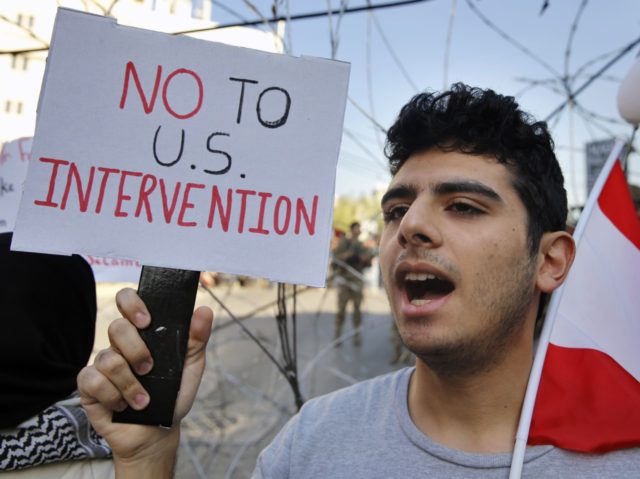Sen. Chris Murphy (D-CT) raised the alarm last week that President Donald Trump still has not released U.S. aid to Lebanon — in the same way that he refused to release aid to Ukraine earlier this year. But the Connecticut Democrat may have highlighted one of the strengths of Trump’s argument against impeachment.
One of the most overlooked moments during the impeachment inquiry in the House Intelligence Committee last month was when senior State Department official David Hale testified behind closed doors that the president held up aid to Lebanon at the same time as, and in the same manner as, aid to Ukraine. Though both aid packages had been approved by Congress, Trump blocked both of them — and, in both cases, did so without explanation.
As with the Ukraine aid, there are questions about the legality of such a lengthy hold, as well as questions about whether holding the aid past the end of the fiscal year on Sep. 30 would require a rescission of such aid in future.
The hold on aid to Ukraine led to a whistleblower complaint and the ongoing impeachment inquiry, though no crime has been alleged.
The aid to Lebanon has been ignored — and unlike aid to Ukraine, the aid to Lebanon was never delivered.
Murphy suggested that the president’s decision could become “the next Ukraine or Kurds,” meaning a choice to abandon a key ally:
UPDATE: On my way back from Lebanon. People there are shaking their heads as Trump still refuses to send congressionally mandated security aid. Lebanon may become the next Ukraine or Kurds.
Let me tell you how dangerous this moment is. It’s important and you need to know.
— Chris Murphy (@ChrisMurphyCT) November 26, 2019
However, there may be a very good reason to withhold aid to Lebanon — a reason the public has not been told. (Hale’s speculation about the reason was redacted in the publicly released version of his closed-door testimony.)
The aid is meant to help the Lebanese Armed Forces (LAF), which Murphy describes as a “counterweight” to Hezbollah, the terrorist group controlled and armed by Iran.
As Caroline Glick explained earlier this year in a column at Breitbart News, titled “Time for the U.S. to End Aid to Lebanon,” Hezbollah effectively controls the LAF:
The fear in Washington is that if, in accordance with U.S. law, the U.S. ends its financial and military support for the Hezbollah-controlled Lebanese government and for the Hezbollah-controlled Lebanese Armed Forces (LAF), the vacuum it forms will not go unfilled. Russia may choose to replace the U.S. and so serve as the spoiler, diminishing U.S. power in the region while expanding its own.
On the other hand, if the U.S. does not stop supporting the LAF and the Lebanese government it will harm its own interests in two significant ways. With Hezbollah firmly in control of the Lebanese government, the U.S. will have no way of denying that its support for the Lebanese military directly empowers Hezbollah.
…
Not only is providing direct assistance to the Hezbollah-controlled Lebanese government and Armed Forces illegal under U.S. law, it is undercuts U.S. policy towards Iran. The U.S. sanctions regarding Iran and Hezbollah have diminished Iran’s ability to support Hezbollah financially. Until the sanctions were implemented, Iran’s annual support for Hezbollah totaled $700 million. That assistance has reportedly diminished as a result of the U.S. sanctions. So if continued, U.S. support for the Hezbollah-controlled Lebanese government and armed forces will make up for part of the revenues Hezbollah is losing as a result of U.S. sanctions.
Continued support for Lebanon also harms America’s reputation. Quite simply, a policy that ignores Hezbollah’s control of Lebanon will diminish U.S. standing in the region, harming its ability to deter its adversaries and enemies – first and foremost Iran and Russia.
Both the Bush and Obama administrations armed the LAF, Glick noted in another column in December. However, she noted, “the LAF is controlled by the Lebanese government. And the Lebanese government has been effectively controlled by Hezbollah since 2008. … Moreover, LAF alignment with Hezbollah has increased over the years.”
Glick — a former negotiator for the Israel Defense Forces (IDF) who understands the Middle East better than most members of Congress — criticized President Trump for being prepared to repeat Bush and Obama’s mistakes: “Given the balance of forces between Hezbollah and the Lebanese government and LAF, when viewed solely in the context of Lebanon, the U.S. position is dangerously irrational.”
It appears someone in the White House was listening — or drawing the same conclusion from their own sources.
Meanwhile, by highlighting the continued hold on aid to Lebanon, Murphy is drawing attention to two key facts: first, Trump did not single out Ukraine; second, as president, Trump often has better information about national security and foreign policy than his critics do.
Those facts could prove to be crucial to the president’s defense against impeachment in the coming weeks.
Joel B. Pollak is Senior Editor-at-Large at Breitbart News. He earned an A.B. in Social Studies and Environmental Science and Public Policy from Harvard College, and a J.D. from Harvard Law School. He is a winner of the 2018 Robert Novak Journalism Alumni Fellowship. He is also the co-author of How Trump Won: The Inside Story of a Revolution, which is available from Regnery. Follow him on Twitter at @joelpollak.

COMMENTS
Please let us know if you're having issues with commenting.